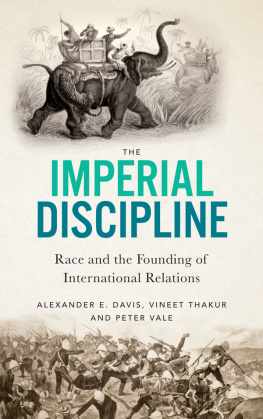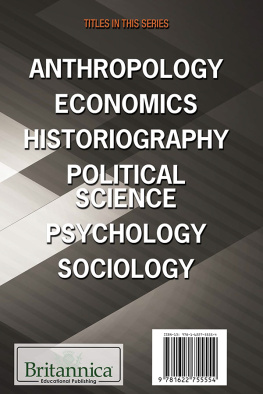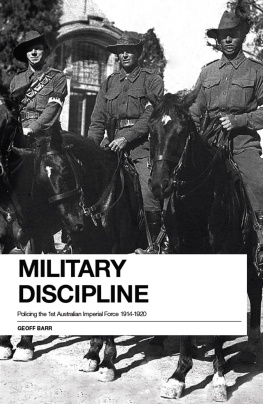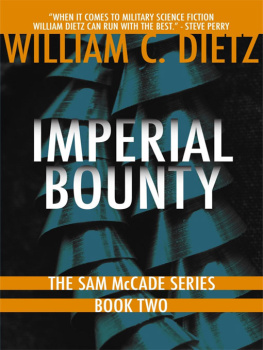Davis Alexander E - The Imperial Discipline
Here you can read online Davis Alexander E - The Imperial Discipline full text of the book (entire story) in english for free. Download pdf and epub, get meaning, cover and reviews about this ebook. publisher: Pluto Press, genre: Politics. Description of the work, (preface) as well as reviews are available. Best literature library LitArk.com created for fans of good reading and offers a wide selection of genres:
Romance novel
Science fiction
Adventure
Detective
Science
History
Home and family
Prose
Art
Politics
Computer
Non-fiction
Religion
Business
Children
Humor
Choose a favorite category and find really read worthwhile books. Enjoy immersion in the world of imagination, feel the emotions of the characters or learn something new for yourself, make an fascinating discovery.
- Book:The Imperial Discipline
- Author:
- Publisher:Pluto Press
- Genre:
- Rating:4 / 5
- Favourites:Add to favourites
- Your mark:
- 80
- 1
- 2
- 3
- 4
- 5
The Imperial Discipline: summary, description and annotation
We offer to read an annotation, description, summary or preface (depends on what the author of the book "The Imperial Discipline" wrote himself). If you haven't found the necessary information about the book — write in the comments, we will try to find it.
The Imperial Discipline — read online for free the complete book (whole text) full work
Below is the text of the book, divided by pages. System saving the place of the last page read, allows you to conveniently read the book "The Imperial Discipline" online for free, without having to search again every time where you left off. Put a bookmark, and you can go to the page where you finished reading at any time.
Font size:
Interval:
Bookmark:

The Imperial Discipline
Race and the Founding
of International Relations
Alexander E. Davis, Vineet Thakur
and Peter Vale

First published 2020 by Pluto Press
345 Archway Road, London N6 5AA
www.plutobooks.com
Copyright Alexander E. Davis, Vineet Thakur and Peter Vale 2020
The right of Alexander E. Davis, Vineet Thakur and Peter Vale to be identified as the authors of this work has been asserted by them in accordance with the Copyright, Designs and Patents Act 1988.
British Library Cataloguing in Publication Data
A catalogue record for this book is available from the British Library
ISBN 978 0 7453 4060 9 Hardback
ISBN 978 0 7453 4062 3 Paperback
ISBN 978 1 7868 0659 8 PDF eBook
ISBN 978 1 7868 0661 1 Kindle eBook
ISBN 978 1 7868 0660 4 EPUB eBook
This book is printed on paper suitable for recycling and made from fully managed and sustained forest sources. Logging, pulping and manufacturing processes are expected to conform to the environmental standards of the country of origin.
Typeset by Stanford DTP Services, Northampton, England
Simultaneously printed in the United Kingdom and United States of America
This has been a long-term project between researchers based at various times in South Africa, the UK, the Netherlands, Australia and India. Such a project is only possible with a great deal of support from multiple institutions. First of all, we would like to thank the University of Johannesburg, where we were all employed concurrently for a short time when much of the research for this book was done, and many of the ideas were thrashed out. We also received great financial and moral support from the University of Western Australia, Institute for History (Leiden University), Gratama Foundation and Leiden University Fund, the Netherlands Institute for Advanced Study in the Humanities and Social Sciences (Amsterdam), the University of Pretoria, La Trobe University and the University of Adelaide.
We would like to thank Millennium: Journal of International Studies, and its editors Sarah Bertrand, Kerry Goettlich and Christopher Murray, for publishing our initial article from this project, Imperial Mission, Scientific Method: An Alternative Account of the Origins of IR, Millennium: Journal of International Studies 46, no. 1 (2017), 323.
We are also grateful to the journal South Asia: Journal of South Asian Studies for allowing us to reproduce parts of the article A Communal Affair over International Affairs: The Arrival of IR in Late Colonial India, South Asia: Journal of South Asian Studies 40, no. 4 (2017), 689705.
The staff members at the following libraries and archives were exceedingly helpful in our archival research: Bodleian Library (Oxford), Chatham House Archives (London), the Barr-Smith Library Special Collections Room (University of Adelaide), Library and Archives Canada (Ottawa), the JC Beaglehole Reading Room (Victoria University of Wellington), Archives New Zealand (Wellington), the British Library (London), National Archives of India (New Delhi), Nehru Memorial and Museum Library (New Delhi), Cory Library (Rhodes University, Grahamstown), Wits Historical Papers (Johannesburg), University of Cape Town Archives (Cape Town) and National Archives of Scotland (Edinburgh).
We would like to thank our families and our partners, Petra Mosmann, Melissa Nefdt and Louise Vale for their support over the years it took to write this book.
In particular, thanks to Petra Mosmann for her careful reading of the final draft of the manuscript.
Peter Vale would like to recognise and remember the late John Barratt, who directed the South African Institute of International Affairs for nearly three decades.
Several of our colleagues were especially helpful in putting together the book and performing the research. We are particularly indebted to Ruth Gamble, Rebecca Strating, Estelle Prinsloo, George Barrett, Luisa Calvete, Karen Smith, Ian Patel and Sanchi Rai.
Finally, we would like to thank Jakob Horstmann and everyone at Pluto Press for their support for this project.
AIIA Australian Institute of International Affairs
ANU Australian National University
CIIA Canadian Institute of International Affairs
ICWA Indian Council on World Affairs
IIIA Indian Institute of International Affairs
INC Indian National Congress
IPR Institute of Pacific Relations
IR International Relations
LoN League of Nations
NZIIA New Zealand Institute of International Affairs
PIIA Pakistan Institute of International Affairs
RIIA Royal Institute of International Affairs
SAIIA South African Institute of International Affairs
SAIRR South African Institute of Race Relations
UN United Nations
WWI World War I
WWII World War II
VUW Victoria University of Wellington
At the end of a long and busy day in the frenetic weeks of activity leading up to signing of the Treaty of Versailles, 33 men gathered in the Paris Hotel Majestic on 30 May 1919. While the bare bones of the League of Nations (LoN) were being thrashed out and debated in every corner of the city, this gathering of men was invited by a British delegate, Lionel Curtis (1872 1955), to discuss an institution quite different from the League. Focusing solely on an inter-state institution like the League, Curtis reasoned, was no guarantee of peace. The text on pages of treaties was often an unreliable barometer of the state of the world. The mind of the public, not the ink on the pages, shaped the future. Hence, he argued, efforts towards peace would eventually have to be directed towards shaping the minds of the public.
Attending this meeting were members of the American and British delegations. The meeting, presided over by General Tasker H. Bliss (1853 1930), American Plenipotentiary to the Peace Conference, was presented with a memorandum, co-written by Curtis and his one-time student at Oxford but now secretary of the LoN Commission, W.H. Shepardson. The memorandum proposed setting up a joint Institute of International Affairs with a branch each in Britain and America. It argued that the interest of the international society at large ought to become the primary factor in international affairs, an interest that required thinking beyond just the nation or the state. As such, universal interest subsumed and surpassed national interest, and in that spirit the memorandum urged that a joint institute with branches across the Atlantic would demonstrate the possibility of embodying such thinking in concrete institutions.
Curtis had been asked to become part of the British delegation by Robert Cecil, the chief of the LoN section of the British delegation. He was selected because he had published an article titled Windows of Freedom in the journal The Round Table, where he had argued that the prospective LoN must ultimately strive for a world government, and suggested that the British Commonwealth could provide a model. Curtis was no arm-chair academic. In the aftermath of the South African War, he had been recruited by Alfred Milner, the High Commissioner to South Africa, as one of a group of youngsters brought to the-then Transvaal to bring administrative efficiency. In 1907, Curtis, who later became one of the central pillars of this group called Milners Kindergarten, made the case for a federated South Africa in a document titled Selborne Memorandum. For the next two and a half years, along with his Kindergarten group, Curtis devoted his energies towards propagandising the need for a unified state in South Africa through publications and Closer Union societies. When the Union of South Africa was finally declared in 1910, the Kindergarten took credit, and going further, made plans to create a federated global empire. The organisation, The Round Table, of which both Curtis and Cecil, as well as several of those present in this meeting were part, was established in 1910 with the purpose of finding a scheme for the organic union of the British empire. Before, and to some extent during, the war, the Round Table had carried out propaganda for a larger federated organisation of the British empire, which Curtis had notched up further with his proposals for a world government. In this period, Curtis had served as the roving ambassador of the Round Table movement.
Font size:
Interval:
Bookmark:
Similar books «The Imperial Discipline»
Look at similar books to The Imperial Discipline. We have selected literature similar in name and meaning in the hope of providing readers with more options to find new, interesting, not yet read works.
Discussion, reviews of the book The Imperial Discipline and just readers' own opinions. Leave your comments, write what you think about the work, its meaning or the main characters. Specify what exactly you liked and what you didn't like, and why you think so.













